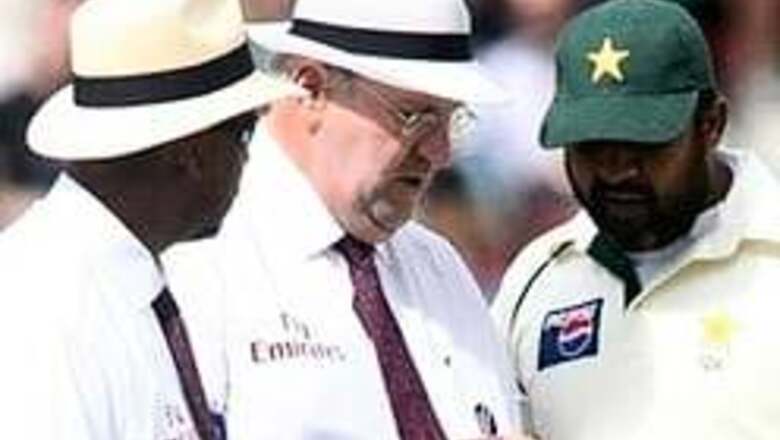
views
Brisbane: Reviled in Pakistan and ridiculed in England, umpire Darrell Hair has been lauded in Australia as the bravest man in cricket for abiding by what he considers to be of paramount importance: the rules.
Hair was described as a 'mini Hitler' by Imran Khan and accused of being a racist by people across the Indian subcontinent after he penalised Pakistan for ball tampering, prompting a boycott that resulted in the Test match being awarded to England by forfeit.
Former Australian captain Steve Waugh, while conceding Hair could come across as a stickler for the rules, supported the decision process that resulted in the first forfeit in almost 130 years of Test cricket.
Waugh posted a hundred in the infamous Melbourne Test in 1995 when Hair called Sri Lanka spinner Muttiah Muralitharan, now the second-most successful wicket-taker of all time for bowling with an illegal action seven times on the first day. That sparked a hate campaign in Sri Lanka and death threats against Hair.
While Hair has started umpiring matches involving Sri Lanka again, Pakistani cricket authorities are pushing for the Australian official to be barred from their future matches.
However, Simon Taufel, voted the world's top umpire of 2005, agreed with Hair's interpretation that Inzamam-ul-Haq and his Pakistan lineup, by refusing to return for play after the tea interval at The Oval on day four, had forfeited the fourth Test.
"If the fielding side refuses to take the field, there is not much the umpires can do," Taufel told the Sydney Morning Herald newspaper.
"Umpires have to follow the laws as they are written. It's hard to fault the umpires in this case."
Besides, Taufel said, Hair came to the decision after consulting with his fellow umpire Billy Doctrove.
"The Darrell Hair I know calls the game the way he sees it without fear or favour," Taufel said. "He knows the laws better than anyone."
Dick French, who stood in 19 Test matches and was a mentor for Hair in the 1980s, said Hair's decisions did not reflect prejudice of any kind.
"There is no allegation of bias or racism, not at all," French said. "There's nothing like that."
PAGE_BREAK
French said Hair "rates right up the top" of international umpires and, inside the fraternity, was a highly respected role model for younger officials.
Two of Australia's leading cricket analysts hailed Hair as a hero.
Robert Craddock, writing in a syndicated column for Brisbane's The Courier-Mail under the headline "bravest man in cricket," said Hair made tough decisions on issues that other umpires were inclined to ignore because of the fuss -- namely ball tampering.
"Darrell Hair is prepared to poke his nose into grubby corners of the cricket world where most of his fellow umpires refuse to go," Craddock said.
"Over the years he's been called dictatorial and officious and both accusations have at times been correct. But they should never overshadow the one great strength of his decision-making -- the courage to back his opinion even when the proTesting millions disagree with it."
"Cricket needs no-nonsense characters such as Hair who keep the game honest."
Malcolm Conn, writing in The Australian, predicted the 'Asian bloc' of India, Pakistan, Sri Lanka and Bangladesh would unite to try and force Hair out of the game and the International Cricket Council would relent at its peril.
"Cricket is once again on the verge of disgracing itself by failing to support an umpire who has the courage to uphold the laws of the game," Conn said.
"Hair should be considered a hero for his courage, despite being subjected to death threats in the past. The spirit of cricket is central to the well being of the game and Inzamam crushed that spirit by refusing to play."
The support for Hair follows a paradox in Australia, where the gentlemanly ideal of something being considered wrong because its "just not cricket" coexists with an anti-authority tendency that evolved from Australia's convict colony roots.
For the likes of Waugh, a cricket umpire's decision is final, resent it as much as you like, but get on with it.
"No one is bigger than the game," said Waugh, whose 168 Test caps is a cricket record. "The laws are there for a reason."
While Hair has been pilloried as an attention-seeker in England, Waugh said the umpire was within his rights to stand by his decision and knew there'd be repercussions.
"He would know the storm it could create. He has been through the Murali incident so he knows the ramifications of doing it," Waugh said. "He would not have done it lightly.
Hair "stands by what he believes so you can't ask much more from an umpire."












Comments
0 comment